The AI large language models (LLMs) of Bing, Gemini, and ChatGPT have been the talk of the digital town.
Undoubtedly, part of the buzz is the annual hype cycle where agencies (and marketers, generally) feverishly focus on how the hot tech of the moment (voice assistants, the Metaverse, etc.) will disrupt the industry and how our clients can catch the wave.
In the SEO and content worlds, AI presents the greatest potential for disruption of any recent tech.
Will it replace search entirely? Will SEO pros be replaced by AI? Will content lose its value?
As Google's Jack Krawczyk recently asserted, "Bard [now Gemini] is not search." The answer is more nuanced: There will be some changes, but not the major upheaval some fear.
So, how could AI affect content strategy in the next few years?
Looking at past changes to search engine results and ranking factors could give us an idea of where search is headed when AI is thrown into the mix.
How Search and User Behavior Will Evolve
Over the past nine years Google has been experimenting with the best ways to provide "instant answers" to users via featured snippets, such as Answer Box and People Also Ask. Those features, while reducing traditional organic real estate, have provided savvy SEOs with the opportunity to capture a greater share of the page by anticipating and answering users' questions about the brand.
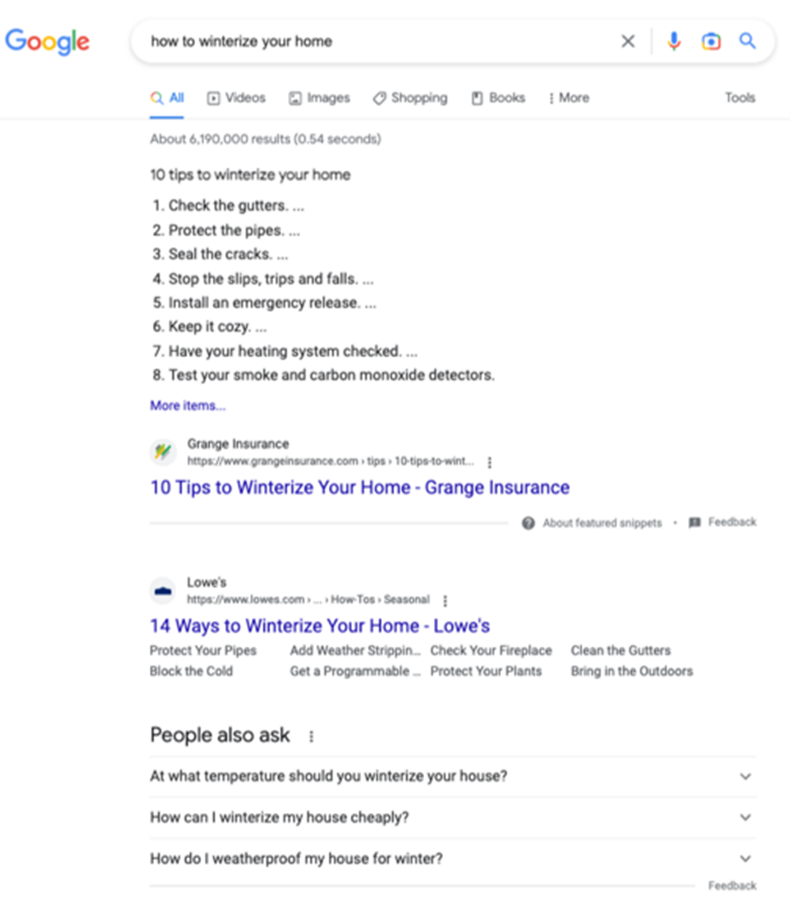
We already know that less than half of searches result in a click because user queries are being answered in the search engine results page (SERP) by snippets.
Now, with AI chatbots, users are becoming accustomed to even more: Receiving answers in their preferred tone, length and level of detail displayed directly in front of them. No longer is searching, scrolling through SERPs, and clicking through pages to find an answer the easiest option.
If the accuracy of the AI-powered answers improves significantly (as we expect it will), the subsequent shift in user behavior could further alter the landscape of SERPs. AI chatbots could soon usurp the role that featured snippets currently fill, delivering answers to searchers in a Q&A format, finally fulfilling the "answer to any question" promise that Ask Jeeves made in 1999.
This may encourage users to write more conversational queries/prompts in the SERP, instead of searching with keywords. For example, rather than typing "best 65 inch TV," people might write "I have a small living room; suggest 5 televisions under $1,000 with a 4+ star rating that would fit my space."
In that scenario, the user delegates the searching process to the AI bot and waits for results.
Brands may lose the clicks from these snippets, but it will still be important to anticipate and answer users' questions. AI assistants, such as Gemini, rely on information from the Web, and you want to make sure that online information about your brand is accurate. There's no better way than to be honest, open, and responsive to questions and not leave anything to chance.
Google Has Been Building Up to This Moment
Google spent decades building a reputation as one of America's most trusted tech companies by adjusting its algorithm to filter out fraudulent or unverified information and provide users with trustworthy results.
The 2011 Panda algorithm changed the conversation around site quality. Panda aimed to weed out lower-quality content, hitting content farms that created as many pages as possible for higher rankings. That was the first time that Google made it abundantly clear that quality matters for ranking.
Google has refined those quality standards over time leading up to the 2022 Helpful Content Update. That update codified Google's E-E-A-T (experience, expertise, authority, trustworthiness) guidelines, which made clear quality content takes priority over quantity.
Now Google is promoting content from known authors, qualified in their field, who demonstrate experience with the subject they are writing about—and that's something that AI can't do.
Changes in Content Strategy and Creation
The Web is a wasteland of redundant, low-value content written to drive rankings: There are, for example, more than six million articles online about how to winterize your home, many on websites that have nothing to do with home ownership.
We are already in the midst of a rapid increase in content generation as brands use AI to pump out copious amounts of content in an effort to drive clicks. Although AI enables knowledgeable creators to produce content more rapidly, it also leads to a rise in low-quality content and a potential return to the content farms of the early 2000s.
For SEOs and content teams, the current reality will require a greater emphasis on Google's E-E-A-T (experience, expertise, authority, trustworthiness) guidelines, where quality content takes priority over quantity. Google's recent addition of "experience" as a part of what constitutes good content adds a guideline that generative AI cannot bring to the table because it still cannot experience our world.
The next front in Google's war against spam and low quality content is learning to spot AI-generated content. Google's March 2024 search spam update started unleashing manual actions against mass AI spam sites and aimed to reduce unhelpful content by 40%.
Some of these spam sites, some with extremely high traffic, have been totally removed from the Google index.
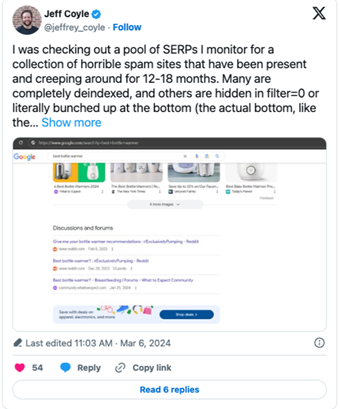
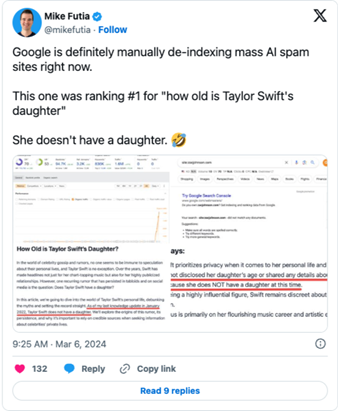
The fresherslive.com site, estimated to have 100% AI content, was averaging around 10 million visitors from search and now has been completely de-indexed.
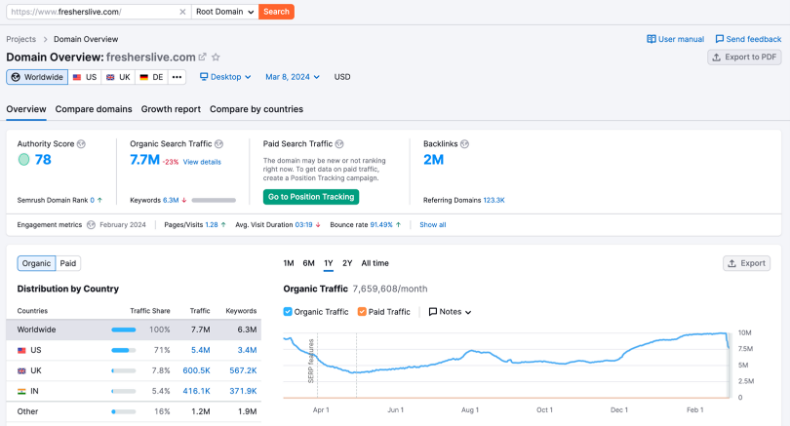
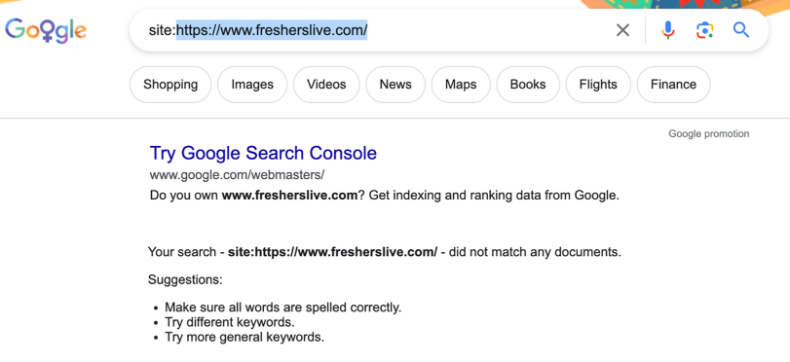
And the same fate awaits not just AI content: Paying humans to produce 20 low-quality articles daily can also draw the same spam penalty.
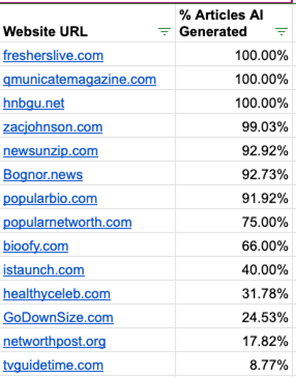
The New AI Landscape for Content: Four Immediate Takeaways
A lot has already changed, and it continues to change very quickly, but there are some takeaways that you can use right now to adapt to the new content AI landscape:
1. Write unique content that has a point of view
Follow Google's Helpful Content guidelines that specify that content should provide value and originality.
Find new spins on well-worn topics, and get away from listicles. Enlist subject-matter experts as your authors, and provide bios on the page to establish expertise.
High-quality content is well-researched, informative, and engaging. AI has a limited ability to research content. Most of these tools create content that's very similar to existing copy because that is what the technology is based on. They can also hallucinate and provide inaccurate information.
2. Create quality over quantity
Resist the urge to use AI to hypercharge your content production. Fully 96.6% of content gets no traffic from search. Why bother pumping out content that no one will see or read?
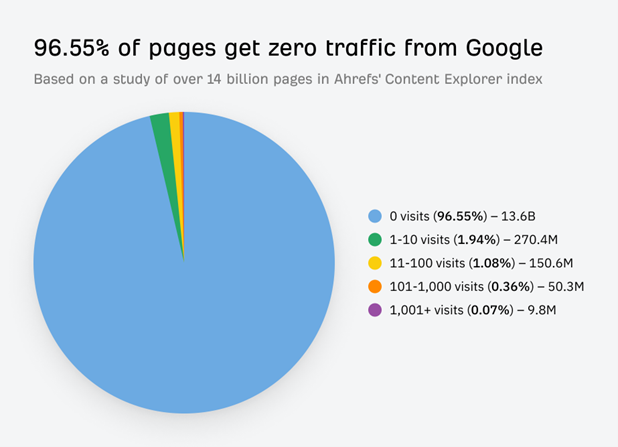
Focus less on quantity and more on creating quality content that has a clear purpose, original point of view, and expert insights.
Review your site content and trim low-performing content. Reducing your content footprint can actually increase traffic and conversions.
3. Use AI as a partner—not full-fledged creator
AI can be an incredible time-saving tool. It can also throw out some great insights, help build outlines of articles, and brainstorm novel approaches to content.
But great creators will use it as a tool, not a crutch.
4. Use conversational data to drive content creation
As conversational AI increases zero-click searches, content will have to be tailored to convince AI tools to showcase our content or ideas to readers.
The conversational AI tools from Google and Bing pull results right from the Web. Better performance will come from quality of content, which requires a deep understanding of audiences' intent.
Just as it is now, sites that build content for the needs of users will continue to win in AI-powered search.
* * *
Once more, it's all about quality. Focus on crafting distinct messages and providing value. Kill your content calendar (i.e., creating content simply because your calendar calls for it), and move away from article quantity as a deliverable. Instead, focus on quality KPIs: social shares, backlinks, and content interactions.
AI is a big revolution, but the humans are still in control, so think like one and deliver the kind of content you'd want to read.
More Resources on the Impact of AI on Content and Search
Marketing at the Speed of Thought: AI Use Cases for Four Content Types
Three Ways Generative AI Will Change B2B Marketing





